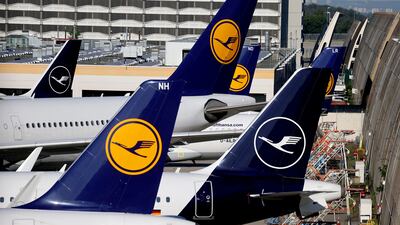Lufthansa plans to raise €2.14 billion ($2.5bn) through a heavily discounted share sale as it strives to repay a German government coronavirus bailout.
The airline group will offer new shares at €3.58 apiece, less than half of Friday’s closing price of €8.21, and aims to return all of its €9bn in state borrowings by the end of the year, according to a statement on Sunday.
The shares rose despite the low issue price, which has long been expected by the market. Oil prices declined for a second session, lifting the broader airline industry, while full repayment will free Lufthansa from restrictive conditions attached to the bailout and allow it to avoid punitive interest payments.
Lufthansa won’t complete the sale until October 5, missing chief executive Carsten Spohr’s original target of repaying the state before a federal election next Sunday. He said earlier this month the airline will instead seek to secure a deal with Chancellor Angela Merkel’s government before she leaves office, which may be some time after the vote due to negotiations over the makeup of a ruling coalition.
Lufthansa traded 3.4 per cent higher at €8.49 as of 10.08am in Frankfurt. The carrier’s stock has lost more than one-fifth of its value this year amid increasing gloom about the pace of a travel recovery, with vaccination euphoria giving way to a realisation that the most profitable intercontinental routes won’t see normal passenger flows this year.
“The timing of the equity raise is puzzling,” Daniel Roeska, an analyst at Sanford C Bernstein, said. “Delaying the raise until a reopening of key long-haul markets may have found more favour among shareholders.”
Germany agreed to bail out Lufthansa at the start of the pandemic after travel bans forced the grounding of global fleets. Repaying the aid would free the company from obligations the European Commission attached to its approval of the deal, such as a ban on dividends, management bonuses and any purchase of a stake of more than 10 per cent in a rival airline.
The capital raise will leave about €1.5bn still outstanding from the original €9bn, with €2.7bn having been repaid earlier and €3.9bn never drawn down.
About €1.5bn of the share-sale proceeds will be used to reduce Germany’s so-called silent participation, with the rest to be repaid from cash flow by the end of the year. The company didn’t say what it would do with the rest of the sale receipts.
“We have always made it clear that we will only retain the stabilisation package for as long as it is necessary,” Mr Spohr said in the statement.
The deal will be underwritten by a syndicate of 14 banks with support from funds controlled by BlackRock, which agreed to a sub-underwriting of €300 million.
The urgency to pay back the funds before the election came as Ms Merkel’s conservatives lost ground to Olaf Scholz’s Social Democrats, a party expected to hold on to the Lufthansa stake for longer. Should Mr Scholz replace Ms Merkel, as polls suggest, he’s also likely to be caught up in lengthy negotiations to form a coalition.
While European airlines such as Lufthansa are now starting to recover from the crisis as short-haul flying resumes, vital markets such as the transatlantic remain largely closed, depriving them of their most valued revenue streams.
Lufthansa expects passenger numbers to reach about half of 2019 levels over the coming months.

